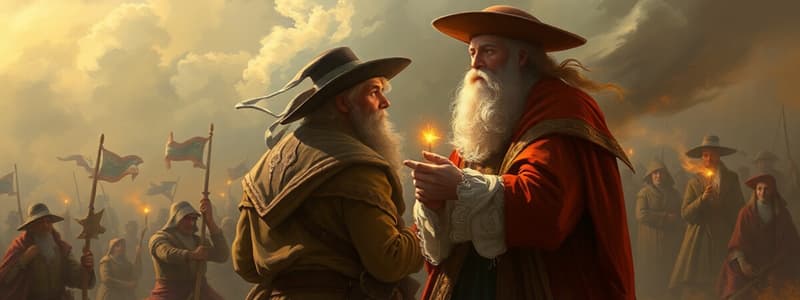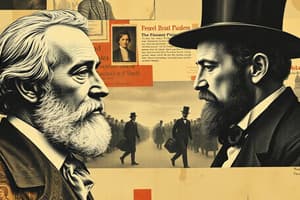Podcast
Questions and Answers
Which concept, advocated by John Locke and Jean-Jacques Rousseau, posits that government legitimacy relies on the consent of the governed?
Which concept, advocated by John Locke and Jean-Jacques Rousseau, posits that government legitimacy relies on the consent of the governed?
- Checks and Balances
- Laissez-faire
- Social Contract (correct)
- Separation of Powers
Deists rely on faith and religious texts to prove the existence of God.
Deists rely on faith and religious texts to prove the existence of God.
False (B)
What economic principle, championed by Adam Smith, suggests that government should minimize intervention in industry and trade?
What economic principle, championed by Adam Smith, suggests that government should minimize intervention in industry and trade?
Laissez-faire
The idea that governments should be divided into executive, legislative, and judicial branches, each limiting the power of the others is known as a system of ________.
The idea that governments should be divided into executive, legislative, and judicial branches, each limiting the power of the others is known as a system of ________.
Match the philosopher with their key work or idea:
Match the philosopher with their key work or idea:
Which of the following is NOT a result of The Enlightenment Period?
Which of the following is NOT a result of The Enlightenment Period?
Jean-Jacques Rousseau's educational philosophy, as expressed in Emile, was embraced by the French monarchs of his time.
Jean-Jacques Rousseau's educational philosophy, as expressed in Emile, was embraced by the French monarchs of his time.
What were the private homes called where philosophes met to discuss enlightened ideas?
What were the private homes called where philosophes met to discuss enlightened ideas?
Flashcards
Philosophes
Philosophes
Philosophers during the Enlightenment who met in private homes.
Deists
Deists
Belief that God's existence can be proven through science and nature.
Social Contract (Locke)
Social Contract (Locke)
Government exists through an agreement with the people; if broken, the people can form a new one.
Checks and Balances
Checks and Balances
Signup and view all the flashcards
Social Contract (Rousseau)
Social Contract (Rousseau)
Signup and view all the flashcards
Laisse-faire
Laisse-faire
Signup and view all the flashcards
Voltaire's Beliefs
Voltaire's Beliefs
Signup and view all the flashcards
Enlightened Monarchs
Enlightened Monarchs
Signup and view all the flashcards
Study Notes
- Intellectual revolutions occur when people discover new ideas and explore new inventions.
- Revolutions in France were reactions to absolute monarchs.
- French monarchs imposed heavy taxes on the people to fund their lavish lifestyles.
- Encyclopedias were compilations of collected information/data and printed books.
- Enlightened philosophers were called philosophes.
- Philosophes gathered in private homes called salons.
- Philosophes developed new religions.
- Deists sought to prove God's existence through facts and science.
- They used samples of nature to show that God was alive.
Key Figures of the Era
- John Wesley founded the Methodist religion.
John Locke
- Locke was an English philosophe.
- He wrote Second Treatise on Civil Government.
- Locke believed government exists only through a social contract with the people.
- According to him, people could withdraw consent and establish a new government if the contract was broken
Baron de Montesquieu
- Montesquieu wrote Spirit of Laws, advocating for democratic government
- He proposed new governments run by a system of checks and balances.
- This system would prevent any one branch from becoming too powerful and ensure the people's wishes were heard.
- The branches of government are:
- Executive: Enforces laws
- Legislative: Writes laws
- Judicial: Interprets laws
Jean Jacques Rousseau
- Rousseau shared Locke's belief in a social contract between the people and the government.
- In his book Emile, he argued that children should have the freedom to develop their natural talents.
- He thought people would be happier living closer to nature.
- His theories were rejected by French monarchs.
Adam Smith
- Smith was a Scottish professor in Edinburgh.
- Author of The Wealth of Nations.
- He argued that a nation's wealth lies in its people and their products.
- He believed government should stay out of industry, advocating for Laissez-faire economics.
- According to him, the government would benefit from taxes, and the people would benefit from trade and prices.
Voltaire
- Voltaire believed in freedom of thought and religion.
- He lived in France, Russia, and Prussia (Germany).
Results of the Enlightenment Period
- The Enlightenment Period ended with the French Revolution, transitioning into the Romantic Period.
- Some monarchs embraced enlightened ideas and granted more freedom.
- Many countries began establishing legislative bodies within their governments.
- The intellectual revolution sparked the Industrial Revolution, the American Revolution, the Latin American Revolution, and the French Revolution.
Studying That Suits You
Use AI to generate personalized quizzes and flashcards to suit your learning preferences.
Related Documents
Description
The Enlightenment was an intellectual movement centered in France, where thinkers known as the philosophes gathered and developed new ideas related to governance and religion. Key figures included John Locke, who conceptualized government as a social contract, and Montesquieu.




